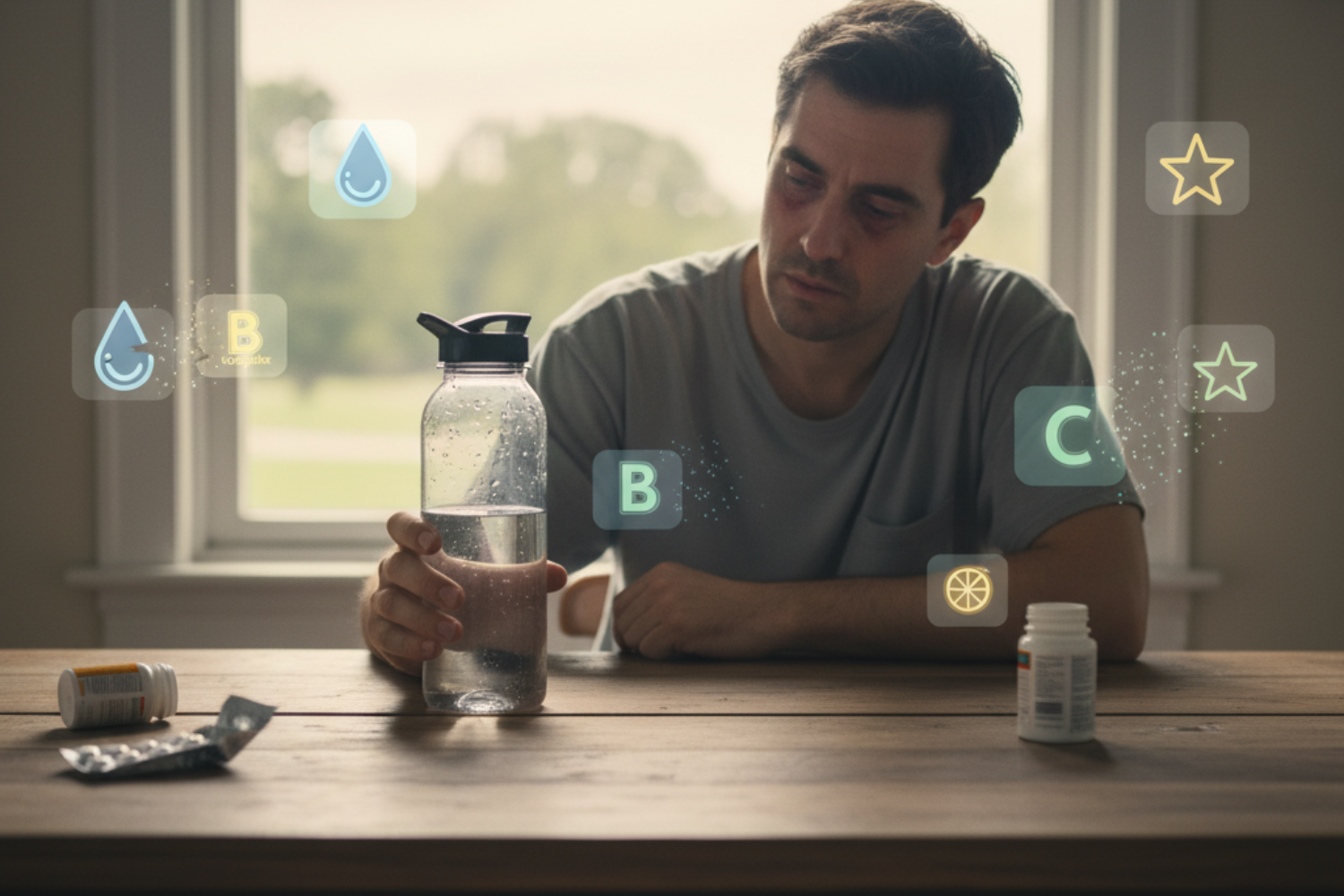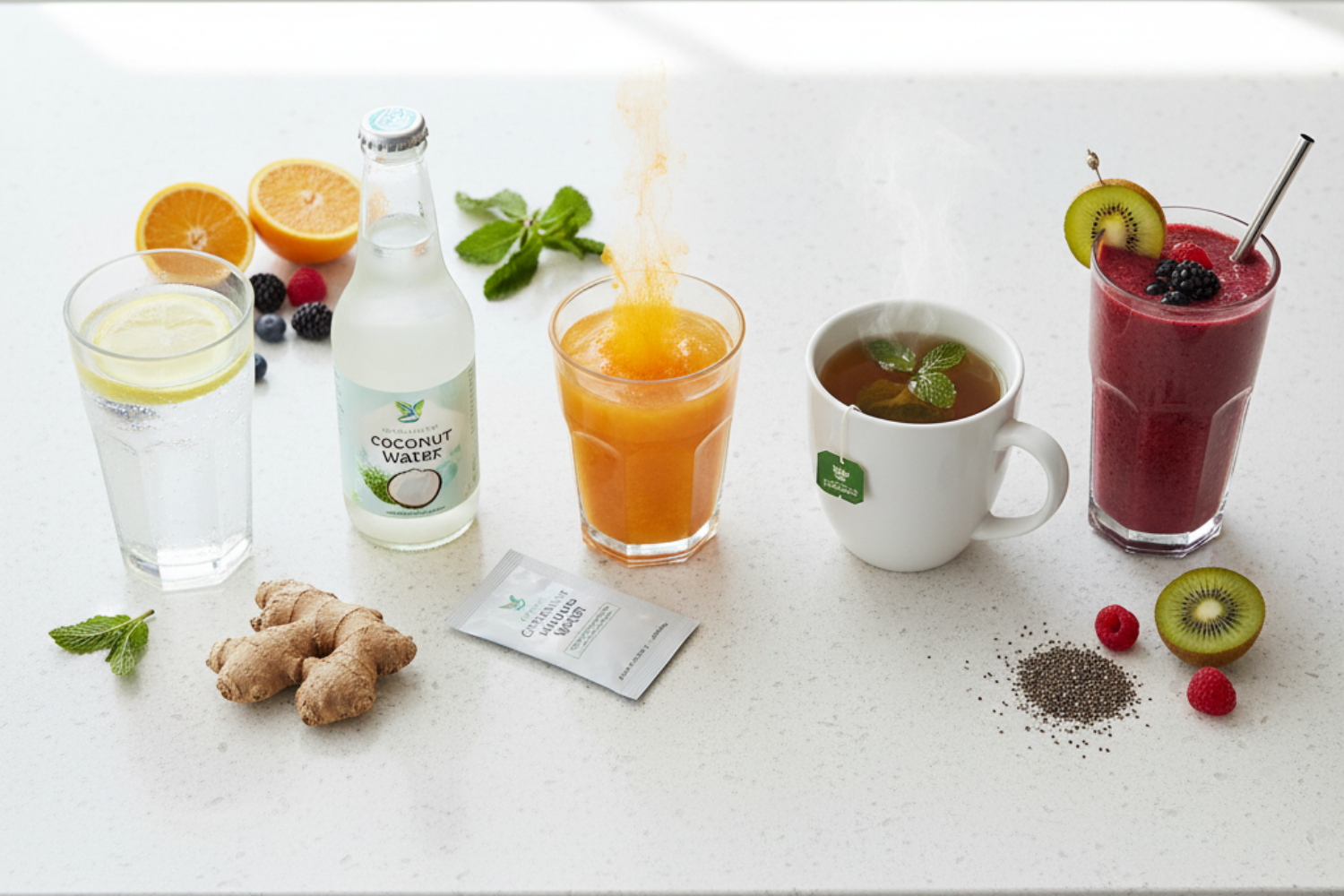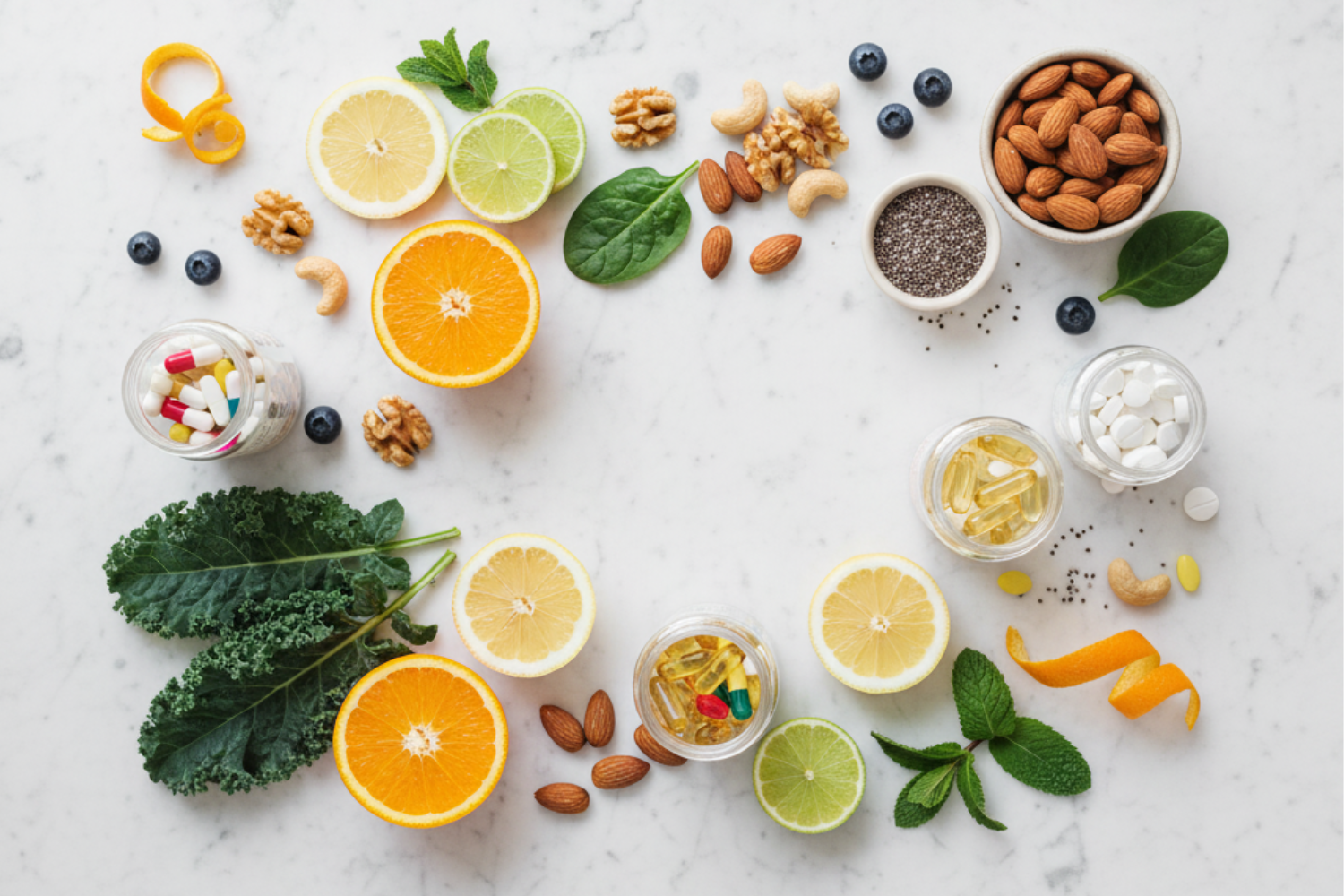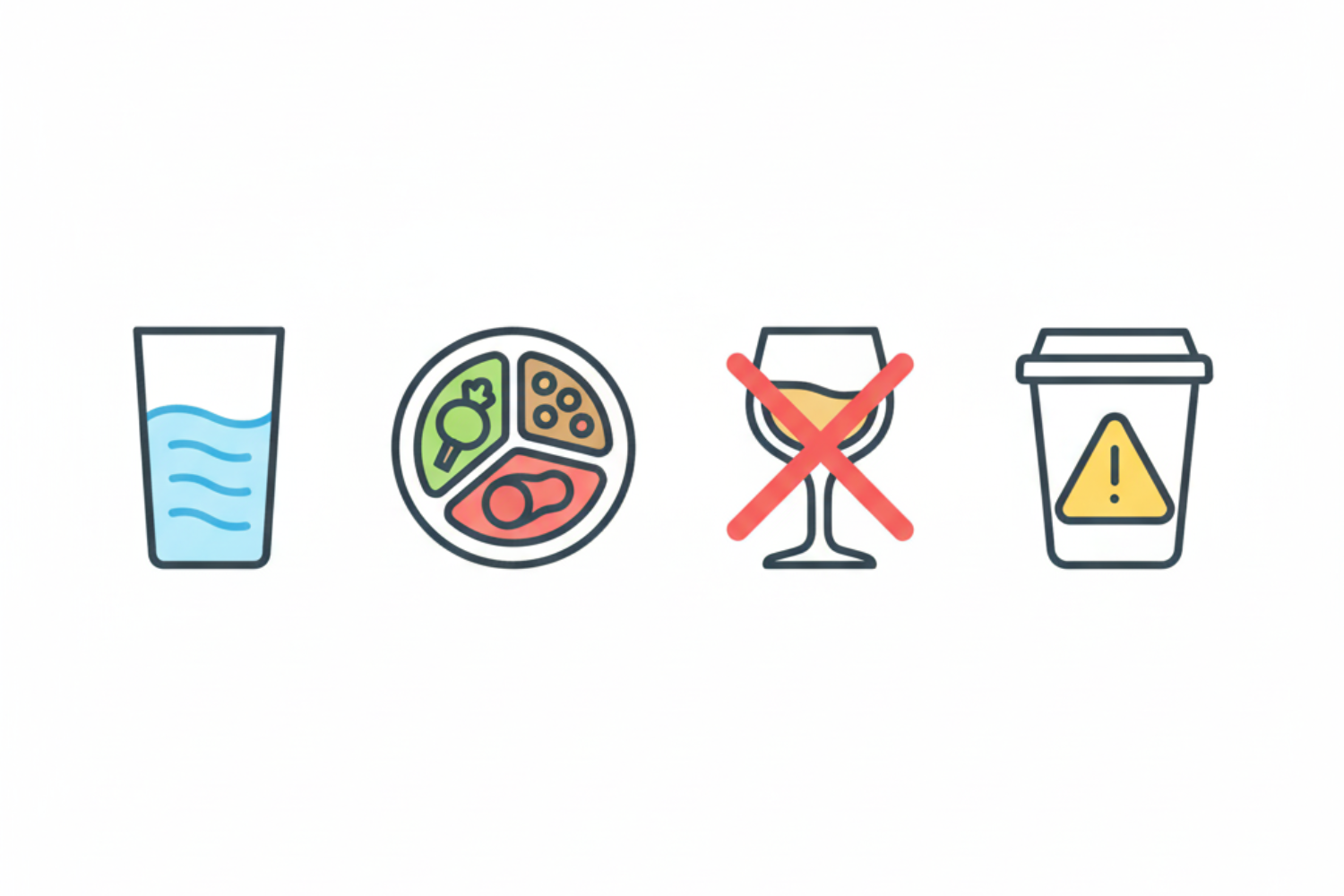The morning after drinking alcohol often comes with a distinctive trio of discomfort: dehydration, fatigue, and a persistent groggy feeling. A well-chosen beverage can support hydration and nutrient intake, which may help you feel more balanced after alcohol consumption, helping to restore fluid balance and replenish the critical nutrients depleted by alcohol.
Focusing on water, electrolyte-rich options, and recovery beverages packed with vitamins and minerals helps replenish lost stores. Additionally, herbal teas, fruit smoothies, and certain supplements containing ingredients like milk thistle, prickly pear extract, or green tea extract may offer support for the body’s natural alcohol metabolism. Knowing precisely what to sip makes a significant difference in how quickly a person can regain their equilibrium.
Why Do You Need a Morning After Hangover Drink?
Alcohol acts as a powerful diuretic, forcing the body to shed fluids and leading directly to dehydration and nutrient loss. Beyond fluids, the liver relies on enzymes and metabolic cofactors, including certain vitamins and minerals, during the alcohol metabolism process. This intense metabolic work leaves the body with fewer reserves to handle ongoing toxins and maintain normal function.
The resulting low blood sugar, poor sleep quality, and physical symptoms such as headaches or stomach distress make the next morning particularly rough. A well-formulated morning drink can help replace fluids and nutrients lost during alcohol consumption, supporting the body's natural recovery processes.

The Best Morning-After Sips
Effective recovery centers on drinks that rehydrate, replenish electrolytes, and provide natural energy sources. Each of these options plays a vital role in helping a person feel steadier and clearer-headed after a late night.
Water Is the Foundation
The simplest measure is also the most crucial. Drinking water replaces lost fluids, alleviates a dry mouth, and supports the body’s ability to flush out alcohol byproducts. Starting the morning with a full glass of plain water, before introducing anything else, sets the stage for genuine hydration.
Electrolyte Solutions
Electrolytes, including sodium, potassium, and magnesium, are absolutely critical for restoring the body’s balance after heavy drinking. A recovery drink or powder containing these minerals helps stabilize energy levels and fully replenish the fluid balance. Choosing products without unnecessary artificial colors supports overall wellness while giving the body the exact mineral components it needs to rebound.
Pure Coconut Water
Coconut water serves as an excellent, natural electrolyte source. It delivers potassium and magnesium in a single, simple drink. It is an easy way to hydrate, restore mineral balance, and provides a natural source of electrolytes like potassium and magnesium, which help support normal fluid balance.
Fresh Fruit Smoothies
A smoothie made with whole, fresh fruit offers a comprehensive approach: carbohydrates that can contribute to maintaining normal blood sugar levels, a host of vitamins and minerals for recovery, and essential hydration. This makes it a smart choice for people who need to replenish depleted nutrients and introduce something gentle to a sensitive stomach.
Ginger and Peppermint Teas
Herbal teas are helpful for addressing common physical hangover symptoms. Ginger and peppermint have been traditionally used to support digestive comfort, though individual results may vary. They provide hydration without added caffeine, making them a safe and comforting choice for an easily unsettled stomach.
Coffee or Green Tea (Use Caution)
A small amount of coffee or green tea can offer a mild energy boost and help shake off immediate fatigue. Green tea extract has been studied for its potential role in supporting the body's natural processes, but caffeine is not a hangover cure. Keeping the consumption light helps avoid contributing to further dehydration while still providing a short-term lift.

Nutrients That Support Recovery After Drinking
Recovery goes beyond merely replacing fluids; it requires restoring the specific vitamins and minerals that alcohol rapidly depletes. Putting these nutrients back into the system helps ensure better overall balance and sustained well-being.
B Vitamins
B vitamins are fundamental nutrients that help the body convert food into energy and support healthy neurological function. Because heavy drinking drastically lowers these levels, replacing them the next morning may help support energy production when levels are low due to dietary depletion.
Vitamin C
Vitamin C functions as an important antioxidant during the complicated process of alcohol metabolism, helping to support the body as it processes alcoholic drinks. Restoring this nutrient may also support immune health, which is often compromised during periods of heavy liver function.
Zinc and Magnesium
These two essential minerals are frequently lost when alcohol’s diuretic effect pulls fluids from the body. Zinc and magnesium are essential minerals involved in muscle and nerve function, and maintaining adequate levels supports overall recovery, making their replenishment a critical step for restoring balance and aiding a smooth recovery.

Tips to Maximizing Your Recovery
Even the best recovery drink performs better when paired with habits that prioritize hydration and nutrient maintenance.
-
Sip water consistently, both before going to bed and immediately upon waking.
-
Pair alcohol with food to slow the rate of absorption and minimize the depletion of vitamins and minerals.
-
Avoid the "hair of the dog," as consuming more alcohol only delays recovery and worsens symptoms later.
-
Be cautious with high amounts of caffeine or sugary energy drinks, which can potentially lead to crashes, further dehydration, or low blood sugar later in the day.

Finding the Right Morning After Drink for Recovery
The most effective strategy for morning recovery combines focused hydration, electrolyte replacement, and the targeted restoration of nutrients that alcohol removes. Choosing supportive drinks helps ease fatigue, restore natural energy, and significantly lessen the persistent groggy feeling that follows a night of drinking.
For those who regularly enjoy socializing, proactive supplementation is an easy way to support hydration, liver function, and nutrient balance the next day. Drinkwel supplements include ingredients such as milk thistle and B vitamins, which are traditionally used to support healthy liver function and maintain hydration.
Frequently Asked Questions
What is the single best morning-after drink?
Plain water and dedicated electrolyte drinks are the best starting points for immediately restoring lost fluids and mineral balance.
Do electrolytes truly help after drinking?
Yes, electrolytes are essential; they quickly replace the sodium, potassium, and magnesium lost due to the diuretic effect of alcohol.
Is coffee a good or bad choice for hangovers?
Coffee provides a short-term energy lift, but it does not address underlying hangover symptoms and can contribute to further dehydration.
Can smoothies help with hangover recovery?
Absolutely. Smoothies provide hydration, natural carbohydrates to stabilize blood sugar, and essential vitamins and minerals all in a gentle format.
What can be consumed before bed to support hydration and help reduce next-day discomfort?
Drinking a large glass of water before going to sleep is the most effective way to reduce the severity of dehydration, which is the root cause of many next-day symptoms.
References
-
Benton, D., & Parker, P. Y. (1998). Breakfast, blood glucose, and cognition. The American journal of clinical nutrition, 67(4), 772S–778S. https://doi.org/10.1093/ajcn/67.4.772S
-
Eggleton M. G. (1942). The diuretic action of alcohol in man. The Journal of physiology, 101(2), 172–191. https://doi.org/10.1113/jphysiol.1942.sp003973
-
Kuriyama, S., Shimazu, T., Ohmori, K., Kikuchi, N., Nakaya, N., Nishino, Y., Tsubono, Y., & Tsuji, I. (2006). Green tea consumption and mortality due to cardiovascular disease, cancer, and all causes in Japan: the Ohsaki study. JAMA, 296(10), 1255–1265. https://doi.org/10.1001/jama.296.10.1255
-
Lete, I., & Allué, J. (2016). The Effectiveness of Ginger in the Prevention of Nausea and Vomiting during Pregnancy and Chemotherapy. Integrative medicine insights, 11, 11–17. https://doi.org/10.4137/IMI.S36273
-
Murray B. (2007). Hydration and physical performance. Journal of the American College of Nutrition, 26(5 Suppl), 542S–548S. https://doi.org/10.1080/07315724.2007.10719656
-
Saat, M., Singh, R., Sirisinghe, R. G., & Nawawi, M. (2002). Rehydration after exercise with fresh young coconut water, carbohydrate-electrolyte beverage and plain water. Journal of physiological anthropology and applied human science, 21(2), 93–104. https://doi.org/10.2114/jpa.21.93
-
Seitz, H. K., & Stickel, F. (2006). Risk factors and mechanisms of hepatocarcinogenesis with special emphasis on alcohol and oxidative stress. Biological chemistry, 387(4), 349–360. https://doi.org/10.1515/BC.2006.047
